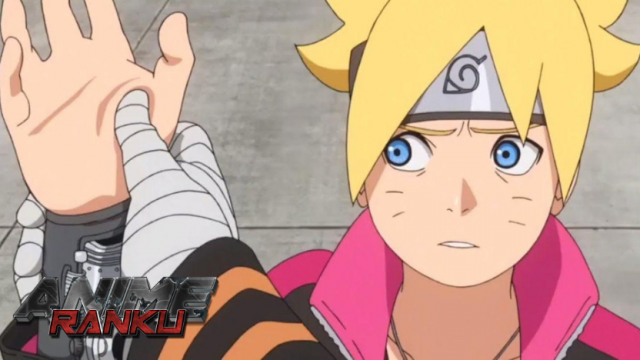In the Boruto manga, Konoha is preparing for a possible attack from Code, Isshiki’s former protege, as Naruto and company prepare to defend themselves. Because of this, despite his shady revelations about his scientific past and how he created weapons for Isshiki, they have welcomed Amado back into the fold. Even though Amado has previously caused friction with the village, they are willing to make accommodations because they need all hands on deck after Naruto lost Kurama and Sasuke lost his Rinnegan.
Amado including her powerful bratty brother Daemon and the all-seeing Eida in the mix also played a significant role in this. Shikamaru can’t help but feel that they need these warriors as weapons in the impending war, despite his internal objections. The trade-off is one that Boruto and Kawaki accept as well, even though they are still figuring out their Karma marks and are aware that they might falter in battle, particularly given Momoshiki’s hold over Boruto. Sadly, Chapter 76 simply transformed the crowded safe house into a teenybopper adaptation of MTV’s The Real World, which seriously undermines the momentum of what ought to be a somber, menacing arc.
Boruto’s Safe House Transforms Into a Tiny Love Den

In the 1990s, The Real World was infamous for having strangers live together, which resulted in numerous hookups and conflicts. Fans of reality TV at the time loved this type of drama, but much of it came across as superficial, silly, and vapid. Nevertheless, MTV heavily promoted it because it was a ratings hit for young adults at the time, which led to programs like Jersey Shore and Road Rules for more recent generations. By having Eida invite Sarada and Sumire for a sleepover to the home she and her younger sibling are using as a haven, Boruto takes this obvious route. Shikadai arrives too, but Eida entrances him and shoos him away, making it clear she wants a girls’ night out, albeit with people she has absolutely no connection with.
As for Boruto, he is envious that Eida likes Kawaki more than he does, which causes Daemon to scold him. The problem is that Boruto shouldn’t be acting this way because he doesn’t know anything about her and wasn’t swayed by her love spell. Eida laments how to make Kawaki believe they are soulmates when he continues to be uninterested. When she inquires as to why they aren’t engaged in a love triangle with Boruto, Sarada and Sumire are at a loss for words and advice, which makes the situation even stranger.
It’s such a bizarre idea to put forth, especially given that they end up in a bed during this sleepover and the Konoha-nin feels uncomfortable and strange. They ought to be talking about her love charm more, but once more, the narrative chooses to focus on unimportant quarrels, romantic concerns, and other topics that seem so out of place after their conflict with Isshiki.
The den is more childish, immature, and dull as a result of this interaction than at first appears. If the kids had been close friends, the plan might have worked, but not when it was put together and carried out in this manner. It also has a story that feels dated and not like it is moving away from worn-out stereotypes, tropes, and clichés. Other people or those expressing interest in the comic book world, especially those from the Western hemisphere, who feel that these kinds of arcs and sub-threads are overdone, have also made the genre come off as unattractive due to such stereotypes regarding teen love. Such detractors and those who would be turned off and away are in fact proven to be correct as Boruto presents this timeless piece of evidence.
Boruto’s Love Problem Seems Artificial

This predicament honestly feels forced and regressive, nodding to how inorganic it was when the likes of Sakura and Karin fawned over Sasuke in their teen days. Granted, this best boy is a concept a lot of manga and anime harp on, but the way Boruto packs everything together, it’s just too many nonsensical beats at a time when domestic safety should be of paramount importance. This drama shouldn’t be priority, especially if Eida wants to protect Kawaki from Code and get back at the latter for betraying her.
Eida and Kawaki ought to be developing a friendship, coming up with strategies for him, and talking about how Amado made them into loners devoid of agency when he made them for the Kara cell because they do have their own jealousy arcs. This level of complexity and character growth might inspire a genuine romance or even make Boruto feel alone and cause a rift to form naturally. It would explain why he and Kawaki might later turn against each other because they might believe that Kawaki is superior to them on all fronts, which would be a nod to their earlier envy (which ironically, Naruto and Sasuke also had). Instead, Eida’s time is eaten up with Sarada and Sumire thrown into the mix as outliers impervious to Eida’s mind-control, as if producers are trying to engineer beef for MTV’s hidden cameras.
In the end, this lightheartedness is ruining what could have been a powerful storyline, as Kawaki and Boruto should be debating how to handle the siblings should they turn bad. This may even result in the boys becoming closer and honing their mental and tactical skills as “brothers,” which would make their eventual breakup even more painful. However, this opportunity for relationship-building is lost, leaving Boruto fans hoping the narrative returns to the grave threat at hand rather than focusing on children fighting over attention, games, and love when the franchise is attempting to prop them up as responsible teens forced into adulthood under the cover of war.















Leave a Reply